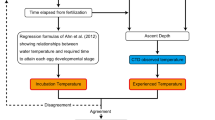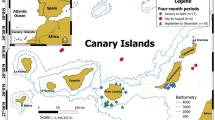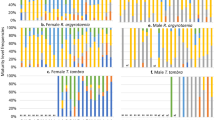Abstract
THE sardine is the principal food-fish of the lands bordering the Adriatic Sea. It is fished only from April to September, since it disappears from the fishing grounds from October to March. This period is the spawning time, when it migrates to regions hitherto unknown. The eggs float in the upper layers of the sea and are therefore found in the plankton. We have now been able to determine the spawning areas by means of systematic plankton studies throughout the Adriatic1. In the course of this work, it was found that the sardine (Sardina pilchardus) spawns at a certain time of day, namely, in the evening. This is an extension of the finding of Ahlstrom2 for the Californian sardine (Sardinops caerulea). Since the phenomenon seems to be unknown in other marine fishes, we think it worth while to describe our method and results.
This is a preview of subscription content, access via your institution
Access options
Subscribe to this journal
Receive 51 print issues and online access
$199.00 per year
only $3.90 per issue
Buy this article
- Purchase on Springer Link
- Instant access to full article PDF
Prices may be subject to local taxes which are calculated during checkout
Similar content being viewed by others
References
Gamulin, T., Rep. Inst. Oceanog., Split, No. 4 C (1954).
Ahlstrom, E. H., Spec. Sci. Rep. No. 23, Fish and Wildlife Service, U.S.A. (1943).
Author information
Authors and Affiliations
Rights and permissions
About this article
Cite this article
GAMULIN, T., HURE, J. Spawning of the Sardine at a Definite Time of Day. Nature 177, 193–194 (1956). https://doi.org/10.1038/177193b0
Issue Date:
DOI: https://doi.org/10.1038/177193b0
Comments
By submitting a comment you agree to abide by our Terms and Community Guidelines. If you find something abusive or that does not comply with our terms or guidelines please flag it as inappropriate.



